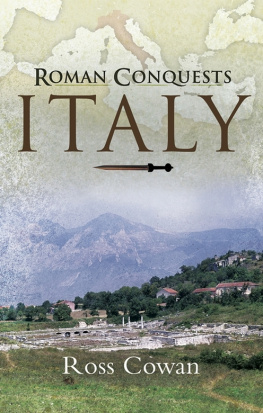John D. Grainger - Roman Conquests: Egypt and Judaea
Here you can read online John D. Grainger - Roman Conquests: Egypt and Judaea full text of the book (entire story) in english for free. Download pdf and epub, get meaning, cover and reviews about this ebook. year: 2012, publisher: Pen & Sword Military, genre: Non-fiction. Description of the work, (preface) as well as reviews are available. Best literature library LitArk.com created for fans of good reading and offers a wide selection of genres:
Romance novel
Science fiction
Adventure
Detective
Science
History
Home and family
Prose
Art
Politics
Computer
Non-fiction
Religion
Business
Children
Humor
Choose a favorite category and find really read worthwhile books. Enjoy immersion in the world of imagination, feel the emotions of the characters or learn something new for yourself, make an fascinating discovery.
- Book:Roman Conquests: Egypt and Judaea
- Author:
- Publisher:Pen & Sword Military
- Genre:
- Year:2012
- Rating:3 / 5
- Favourites:Add to favourites
- Your mark:
- 60
- 1
- 2
- 3
- 4
- 5
Roman Conquests: Egypt and Judaea: summary, description and annotation
We offer to read an annotation, description, summary or preface (depends on what the author of the book "Roman Conquests: Egypt and Judaea" wrote himself). If you haven't found the necessary information about the book — write in the comments, we will try to find it.
Roman Conquests: Egypt and Judaea — read online for free the complete book (whole text) full work
Below is the text of the book, divided by pages. System saving the place of the last page read, allows you to conveniently read the book "Roman Conquests: Egypt and Judaea" online for free, without having to search again every time where you left off. Put a bookmark, and you can go to the page where you finished reading at any time.
Font size:
Interval:
Bookmark:
P E N & S W O R D M I L I T A R Y
an imprint of
Pen & Sword Books Ltd
47 Church Street
Barnsley
South Yorkshire
S70 2AS
PDF ISBN: 978-1-47382-952-7
EPUB ISBN: 978-1-47382-663-2
PRC ISBN: 978-1-47382-663-2
by them in accordance with the Copyright, Designs and Patents Act 1988.
any form or by any means, electronic or mechanical including photocopying, recording
or by any information storage and retrieval system, without
permission from the Publisher in writing.
Printed and bound in [country] by [printers details]
Sword Maritime, Pen & Sword Military, Wharncliffe Local History, Pen and Sword
Select, Pen and Sword Military Classics, Leo Cooper, Remember When, Seaforth
Publishing and Frontline Publishing.
PEN & SWORD BOOKS LIMITED
47 Church Street, Barnsley, South Yorkshire, S70 2AS, England
E-mail:
Website: www.pen-and-sword.co.uk
Roman Empire at its greatest extent | |
I. | The Roman Near East |
II. | Syria |
III. | Judaea 7663 BC |
IV. | Herods Kingdom |
V. | Upper Egypt |
VI. | Jerusalem |
VII. | Alexandria |









Font size:
Interval:
Bookmark:
Similar books «Roman Conquests: Egypt and Judaea»
Look at similar books to Roman Conquests: Egypt and Judaea. We have selected literature similar in name and meaning in the hope of providing readers with more options to find new, interesting, not yet read works.
Discussion, reviews of the book Roman Conquests: Egypt and Judaea and just readers' own opinions. Leave your comments, write what you think about the work, its meaning or the main characters. Specify what exactly you liked and what you didn't like, and why you think so.
















